Stimulants are drugs that increase your metabolism, heart rate and blood pressure. They make you feel alert, keep you awake, can help you focus, and may cause you to lose your appetite and lose weight. Among drugs that are abused, the amphetamine class of stimulants is both popular and dangerous. In terms of methamphetamine vs. amphetamine, it can be difficult to distinguish between the two, yet there are important differences.
Amphetamine and methamphetamine are prescriptions that help many people, but which also have a high potential for abuse. Another member of this class of drugs, methcathinone, has no clinical use, but has been discovered by abusers and is growing in popularity. It is important to learn about these common, but dangerous stimulants, especially if you are the parent of teens.
Amphetamine vs. Methamphetamine
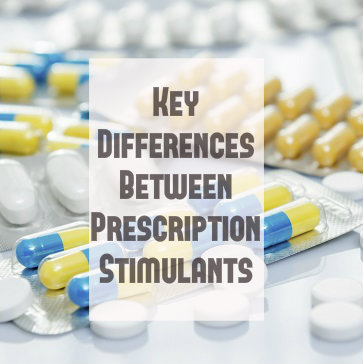 Amphetamine is a stimulant drug from which all other members of its group are derived. It is the base drug. As a stimulant, amphetamine acts on the central nervous system. It is most often prescribed for children with ADHD. It helps them to focus. Amphetamine is commonly abused by high school and college students as a study aid. It produces wakefulness and focus, which makes it a desirable tool for studying long hours. The risks, however, are great. Amphetamine causes side effects like nausea, headaches, shaking, insomnia, nervousness and more. It is also highly addictive.
Amphetamine is a stimulant drug from which all other members of its group are derived. It is the base drug. As a stimulant, amphetamine acts on the central nervous system. It is most often prescribed for children with ADHD. It helps them to focus. Amphetamine is commonly abused by high school and college students as a study aid. It produces wakefulness and focus, which makes it a desirable tool for studying long hours. The risks, however, are great. Amphetamine causes side effects like nausea, headaches, shaking, insomnia, nervousness and more. It is also highly addictive.
Methamphetamine is similar to amphetamine. Like amphetamine, it is a stimulant that increases wakefulness and alertness. It is less often prescribed for ADHD and in rare cases can be used to treat obese patients. Methamphetamine is prescribed less often than amphetamine because it is more harmful. It can cause lasting damage in the brain with long-term use and is extremely addictive. Because prescriptions for methamphetamine are scarcer, users often get it from amateur meth labs. Abusers of meth use it to get a high rather than to study.
Methcathinone vs. Methamphetamine
Another member of the amphetamine stimulant class of drugs, methcathinone, is similar to methamphetamine. Unlike meth, however, it has no clinical use. It is a Schedule I drug in the U.S. because it is dangerous and addictive. It is not prescribed to treat any medical conditions. Methcathinone is chemically very similar to methamphetamine and is also a stimulant.
Like both amphetamine and methamphetamine, methcathinone suppresses the appetite, increases wakefulness, heart rate and energy, and produces alertness in the user. The sense of euphoria that also comes with taking the drug is the main reason people abuse it. The feeling is described as being less intense than that imparted by methamphetamine. As with methamphetamine, methcathinone causes long-term damage and is highly addictive.
All members of the stimulant class of drugs have potential for abuse, but amphetamine, methamphetamine, and increasingly methcathinone are among the most common. Teens and young adults are often drawn to these drugs for either the high, the potential for a study aid, or both. Adults and parents should be aware of these drugs and the harm that they can cause.
If You Or Someone You Love Is Struggling With Stimulant Abuse, Call Us Now – Help Is Available 24/7
People who experience serious problems with the non-addicted abuse of stimulant drugs (e.g., amphetamine, cocaine and methamphetamine) and people addicted to stimulant drugs typically qualify for a diagnosis called stimulant use disorder. After entering treatment for their problems, some individuals with this disorder successfully remain abstinent from stimulant use, while others relapse back into active stimulant intake.
In a study published in June 2014 in the journal Drug and Alcohol Dependence, researchers from a U.S. university and two private institutions compared the brain functions of people with stimulant use disorder who remain abstinent to the brain functions of people with the disorder who relapse.
Stimulant Use Disorder
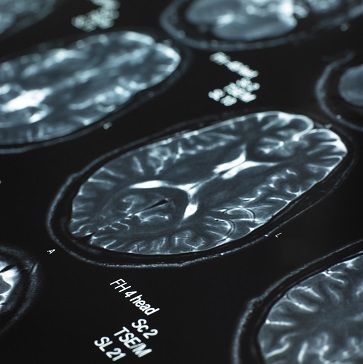 Stimulants are powerful substances that substantially speed up activity in the nerve cells that power the central nervous system (spinal cord and brain), and thereby trigger a speedup in key body functions such as the baseline heart rate and breathing rate. The brain changes associated with stimulant use include the onset of an intense sensation called euphoria, which emanates from a part of the brain commonly referred to as the pleasure center.
Stimulants are powerful substances that substantially speed up activity in the nerve cells that power the central nervous system (spinal cord and brain), and thereby trigger a speedup in key body functions such as the baseline heart rate and breathing rate. The brain changes associated with stimulant use include the onset of an intense sensation called euphoria, which emanates from a part of the brain commonly referred to as the pleasure center.
Some stimulant users become involved in a pattern of abuse when they try to recreate euphoric feelings in their pleasure centers, while others establish a pattern of abuse based on a misguided desire to do such things as increase alertness or improve academic performance.
Over time, habitual stimulant abusers may become stimulant addicts when their brains undergo long-term changes that produce physical dependence, as well recurring drug cravings, loss of control over stimulant intake or a number of other potential symptoms.
The stimulant use disorder diagnosis applies to non-addicted abusers who fall into a dysfunctional pattern of stimulant-related behavior, as well as to people affected by physical stimulant dependence and addiction. The American Psychiatric Association officially established this diagnosis in 2013 as a specific form of a larger illness classification called substance use disorder. Stimulant use disorder replaces independent diagnoses for both stimulant abuse and stimulant addiction. This replacement occurred because current evidence strongly supports a high degree of overlap for symptoms of abuse and addiction in affected stimulant users.
Stimulant Relapse
People in treatment for stimulant abuse/addiction need time to detoxify from active drug use and recover from the long-term changes in their normal brain function. A chief obstacle to this process is the continuing presence of strong urges to consume more of a given stimulant. Typically, these urges are intensified by cues in the everyday environment that recovering stimulant users have previously learned to associate with drug intake. Even in people who ultimately recover and establish a long-term abstinent lifestyle, the persistence of drug-using urges can trigger a relapse either during or after treatment. Relapses are a fairly common occurrence, and addiction specialists typically take them into account when devising treatment strategies for their patients/clients.
Are There Brain Differences In Those Who Relapse On Stimulants?
Researchers from the University of Minnesota, the Hazelden Foundation and a private psychiatric practice used modern imaging technology to compare the brain functions of people who relapse back into stimulant use during or after treatment to the brain functions of people who avoid stimulant use during or after treatment. All told, 18 people diagnosed with substance use disorder took part in the study, as did a second group of 15 people not affected by any form of substance abuse. The researchers performed two sets of brain scans on all of these individuals, and followed up half a year later to see which stimulant users had relapsed back into drug use.
With the advantage of hindsight, the researchers concluded that, at the initial bran scan, the participants who eventually relapsed had far more profound changes in the function of parts of the brain responsible for the critical tasks of maintaining emotional control and regulating levels of pleasure and reward. The participants who relapsed also gradually developed a reduced level of activity in these brain areas in the early stages of their recovery.
The study’s authors believe that the decline in brain function found in the participants who ultimately relapsed back into drug use may serve generally as a physical sign of heightened risks for relapse in recovering stimulant users.
Call Us Now If You Or A Loved One Is Struggling With Addiction Or Has Relapsed. Help Is Just A Phone Call Away!
The problem of prescription drug abuse is one that touches almost everyone in some way. Millions of Americans have abused prescription drugs and are at risk of becoming addicted or even of having a fatal overdose. Teens are particularly vulnerable and don’t always understand the dangers associated with prescriptions. Teens today are abusing prescription drugs in greater numbers than any other age group. Learn how to keep your teen safe in the face of this epidemic.
Which Drugs Are Teens Abusing?
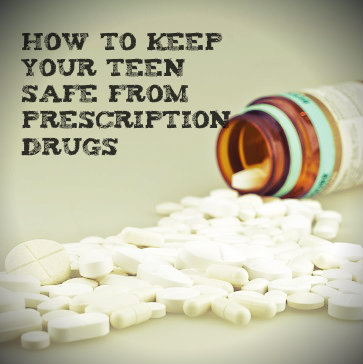 Teens are abusing prescription painkillers in record numbers. These are narcotic controlled substances and are highly addictive and easy to overdose on. In the last 20 years, the number of people between the ages of 12 and 17 that abuse these painkillers has increased ten-fold. No teen demographic is excluded from these statistics. Teens from all socioeconomic backgrounds, of all races, and of both genders are abusing painkillers.
Teens are abusing prescription painkillers in record numbers. These are narcotic controlled substances and are highly addictive and easy to overdose on. In the last 20 years, the number of people between the ages of 12 and 17 that abuse these painkillers has increased ten-fold. No teen demographic is excluded from these statistics. Teens from all socioeconomic backgrounds, of all races, and of both genders are abusing painkillers.
The other category of prescription drugs being abused by teens is stimulants. Stimulant medications are typically amphetamines prescribed for children with attention deficit hyperactivity disorder, or ADHD. Teens abuse them mostly as study aids. They have the effect of keeping the user awake and allowing for more focus and concentration. In a competitive academic world, many teens turn to these drugs to get better grades. The risks are high, of course, and include addiction, long-term health consequences and overdose.
How Can I Keep My Teen Safe From Prescription Drugs?
One of the scariest aspects of the trend in teen prescription drug abuse is that parents are largely unaware of the problem. As many as one in ten teens abuses stimulants, yet most parents have no idea what’s going on. How can you keep your teen safe when you don’t know there is a problem? The first thing you can do to protect your teen is to get to know his activities. By developing an open, communicative and trusting relationship with your teen you will be better tuned in to what is going on with him. You will be more likely to notice if something seems off, which could be attributed to drug abuse.
As you educate yourself about prescription drug abuse, also educate your teen. Knowledge is power and many teens abuse these drugs thinking that they are mostly harmless. If doctors prescribe them, sometimes even to kids, they must be safe, right? This attitude is dangerous. Learn about the risks of taking these medications without a doctor’s supervision and share what you learn with your teen.
It is also important that you minimize your teen’s access to drugs. There are many reasons teens abuse drugs, but one reason they may turn to these prescriptions more than most other substances is access. Most people abusing prescription drugs get them from a friend or family member. If anyone in your family has been prescribed a painkiller or stimulant, make sure it is kept in a secure location that your teen cannot access. Teens also get prescriptions from illegal online pharmacies that don’t check for prescriptions. Control your teen’s access to the Internet and check his history from time to time.
The problem of prescription drug abuse is a serious and ongoing one, for both adults and teens. To keep your teen safe from the epidemic of prescription abuse you need to be aware and knowledgeable. Talk to your teen and make sure he knows that he can come to you with problems. Discuss the risks of abusing drugs and restrict his access to them; take these important steps to reduce the chances that he will experiment with prescriptions.
If You Suspect Your Teen Is Abusing Prescription Drugs – Don’t Hesitate – Call Us Now!
Attention deficit hyperactivity disorder, or ADHD, is a common behavioral disorder in childhood. If you have a child with ADHD you are far from alone. Many kids use medication as part of the treatment for ADHD and there have been some concerns that these drugs could lead to later problems of substance abuse. Whether ADHD medications cause an increased risk for later addiction is not fully known, but what is certain is that you as a parent have the biggest influence over your child’s choices.
ADHD Treatment And Medications
 Experts agree that the best way to treat the symptoms of ADHD, which include hyperactivity, inability to focus or concentrate, and impulsive behaviors, is with both therapy and medication. Using drugs alone is not the best solution to helping kids with ADHD. When they learn to modify their behaviors and are given medications to help them better focus, they have the best odds of success.
Experts agree that the best way to treat the symptoms of ADHD, which include hyperactivity, inability to focus or concentrate, and impulsive behaviors, is with both therapy and medication. Using drugs alone is not the best solution to helping kids with ADHD. When they learn to modify their behaviors and are given medications to help them better focus, they have the best odds of success.
The medications that are used to treat ADHD are stimulants. Although it may seem counterintuitive, these stimulants actually help children to focus, to concentrate on one thing at a time, and to be able to control impulses. There are different kinds of stimulants used for ADHD, including Ritalin, Concerta and Adderall, among others. Children needing one of these drugs may have to try a few before finding the right one and the right dose that maximizes benefits while minimizing side effects.
Will ADHD Medications Cause Future Drug Abuse?
There has been controversy surrounding the use of stimulant medications to treat ADHD in children, but nothing has yet outweighed the benefits that these drugs have given kids. Some claim that kids are overmedicated and the drugs can cause lasting harm, although there is no evidence for this. One very real problem is abuse of ADHD prescriptions. It is not uncommon for teens and college students to use these drugs (which are mostly amphetamines) in large quantities to stay up late for studying and writing papers. This abuse can definitely lead to addiction.
Another controversy has been the fear that even the use of ADHD medications by kids following a doctor’s instructions could lead to future addiction. A few studies have made this connection, but have failed to show whether it was conclusively the drug or other factors that led to later drug abuse. A more recent review of these kinds of studies failed to find real and substantial evidence that ADHD drugs cause a child to abuse drugs or become addicted to drugs later in life.
The review included 15 separate studies and more than 2,000 participants. The result was that being medically treated for ADHD has no connection to future drug abuse. It neither increases nor decreases the risk of drug addiction. An interesting finding is that simply having ADHD can increase a child’s risk of future drug abuse; it seems likely that treating the disorder could therefore reduce the risk.
Good News For Parents Of Children With ADHD
The good news for parents of children with ADHD is that stimulant medications are largely helpful. As long as there are no serious or disruptive side effects the drugs can help kids focus in school, get along with peers better, and be more successful. The risk of developing substance abuse problems later in life is not related to medication.
In fact, what all experts know is that parents’ influence and behaviors is the biggest determining factor in whether a child abuses drugs. Talk to your children about drug abuse and develop a healthy relationship and you can steer them in the right direction.
Read More About Mental Health, Teens And Addiction
The similarity in names suggests that there is a fundamental similarity between amphetamine and methamphetamine. How are they different? How are they the same? While the drugs have the same chemical base, the process they undergo drastically alters the effect they have on the body. The methamphetamine vs. amphetamine question may be used to try to determine which is more harmful or which is more addictive. While the drugs bear similarities, their differences are significant. Read on to understand more about each.
Amphetamines
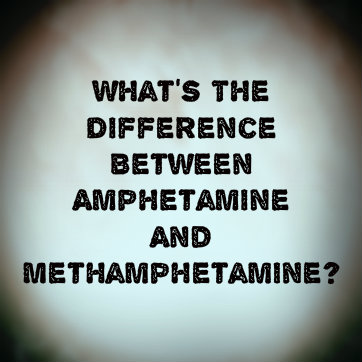 Amphetamine has a variety of medical uses and drugs containing amphetamines have been prescribed by physicians for a variety of conditions. For example, because amphetamines are powerful psychostimulants and increase metabolism, they have often been incorporated into prescription weight loss aids. Amphetamines also have the ability to increase focus and heighten mental clarity and thus have been prescribed to treat those struggling with attention-deficit hyperactivity disorder (ADHD) or to help soldiers stay awake during long stints in the field.
Amphetamine has a variety of medical uses and drugs containing amphetamines have been prescribed by physicians for a variety of conditions. For example, because amphetamines are powerful psychostimulants and increase metabolism, they have often been incorporated into prescription weight loss aids. Amphetamines also have the ability to increase focus and heighten mental clarity and thus have been prescribed to treat those struggling with attention-deficit hyperactivity disorder (ADHD) or to help soldiers stay awake during long stints in the field.
Methamphetamines
Methamphetamine is more commonly associated with illegal, recreational use and is never prescribed medically. Methamphetamine is amphetamine double methylated (amphetamine is methylated once). The science behind this may be complicated for the layperson, but the important thing to understand is that methamphetamine, because it has been methylated twice, is significantly faster acting, more potent, and more addictive, and thus quite a bit more dangerous.
The result of both is euphoria because of increased release of norepinephrine and dopamine in the brain. This release of pleasure chemicals stimulates the brain’s reward center, enticing the user to not only continue use, but, as tolerance develops, to crave ever increasing levels of the drug.
The effects of use are similar in both amphetamines and methamphetamines including increased pulse, hyperactivity, dizziness, and insomnia, but the effects are more potent with methamphetamines. When taken exactly as prescribed and under the careful monitoring of a physician, amphetamine usage can be safe. The same cannot be said of methamphetamines, for which experimentation can carry grave results.
Abuse Of Amphetamine And Methamphetamine
Though amphetamines may boast a variety of medical uses, the prescription drugs containing amphetamines still carry risk as well as unfavorable side effects. These drugs are highly addictive and carry significant potential for abuse.
While they have unique and distinct effects on the body, in both cases the body develops tolerance rapidly and more and more of the drug is required to achieve the desired results. Even if an individual does desire to stop taking the amphetamine-based prescription or to stop using meth, the physical dependence can throw the individual into severe withdrawal.
It is recommended that those intending to cease use of amphetamines or methamphetamines do so under the care and supervision of a doctor or with the assistance of a drug rehab program and related therapy.
So amphetamine vs. methamphetamine isn’t really the issue. Both drugs are potent and dangerous with the potential for abuse and addiction. While amphetamine may be used safely under the supervision of a physician, it still carries risk and should be taken with caution and care.
If You Or Someone You Know Is Struggling With An Addiction
Call Us Now – We Are Available 24/7
14 Mar 2014
Can Diet Pills Be Addictive?
Taking diet pills to supplement weight loss can be beneficial for some people, but risky for others. If you are worried about someone you love who is taking diet pills, learn more about them and what to do to help. The Food and Drug Administration (FDA) has approved very few medications for assisting with weight loss. Many over-the-counter remedies are supplements and are not regulated. Understand the dangers and side effects that come with taking these diet aids and confront your loved one if you are worried about her health and wellbeing.
How Do Diet Pills Work?
Different diet supplements work in different ways. Most are supposed to suppress your appetite and supplements that make this claim may include green tea extract, chromium, drugs called catecholamines, or an herb called hoodia. How effective these are is uncertain.
Types Of Diet Pills
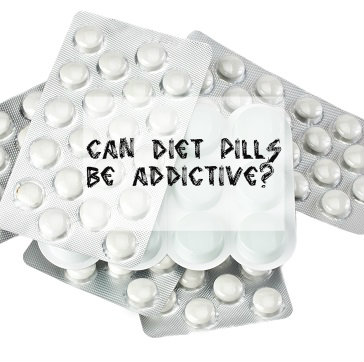 One prescription drug that works as an appetite suppressant is called phentemine.
One prescription drug that works as an appetite suppressant is called phentemine.
Another FDA-approved medication, which is available without a prescription, is called Alli. It aids in weight loss by blocking the body’s absorption of dietary fat. Other supplements claim to be able to block fat, but have not been evaluated by the FDA. They include ingredients like chitosan and guar gum.
The third and most dangerous type of diet drug includes stimulants. Stimulants are drugs that boost your metabolism causing you to burn more calories. Controversial pills, such as those that have ephedra as an ingredient, are often stimulants. Bitter orange is another herb you might see as an ingredient in a stimulant diet pill. Amphetamine, which is a prescription drug used to treat ADHD and narcolepsy, is often abused by people trying to lose weight because it is a powerful stimulant.
Are Diet Pills Addictive?
Most of the ingredients found in diet pills are not chemically addictive. In other words, unlike addictive drugs, they do not cause physiological changes to the brain that can lead to dependence. Stimulant drugs are an exception, especially amphetamine. Anyone abusing amphetamine to lose weight is putting herself at risk for addiction.
While most of the diet pill ingredients are not addictive, there is always the possibility of a psychological dependence on these medications. If someone you love is taking any type of diet pill more often than seems normal and is obsessing over her weight, she may have a type of addiction. She may also have an eating disorder or be on the path to developing one. It is important to intervene before she goes too far and really puts her health at risk.
What Are The Side Effects Of Taking Diet Pills?
There are plenty of potential side effects from all types of diet pills. Some are just uncomfortable, but others are dangerous. The riskiest side effects come from stimulants because they cause an increase in heart rate and blood pressure. When combined with alcohol, stimulants are especially dangerous. Other less serious side effects include headache, diarrhea, nausea, gas, constipation, insomnia and upset stomach.
How Can I Help If I Know Someone Who Is Overusing/Misusing Diet Pills?
If you know someone who is taking risks with diet pills, step in and express your concern. Educate your friend about the dangers of these pills, especially if she is taking stimulants. Encourage her to seek professional therapy so that she can learn how to have a healthy attitude toward her weight and her body. The best way to lose weight is through diet and exercise, so offer to be her partner in making good food choices and in working out.
Read More About Prescription Stimulant Abuse In Moms…And The Dangers
If you have had a child diagnosed with attention deficit hyperactivity disorder (ADHD) you probably have a lot of questions and just as many concerns. We hear a great deal in the media about over-medicating children. What does this mean for your child and his disorder? Will using medications to help him focus put him at risk for further drug abuse, and even addiction? The answers to these questions are not simple, but the more you learn about ADHD medications and treatment, the more comfortable you will be making decisions in the best interest of your child.
How Do Medications Help Children With ADHD?
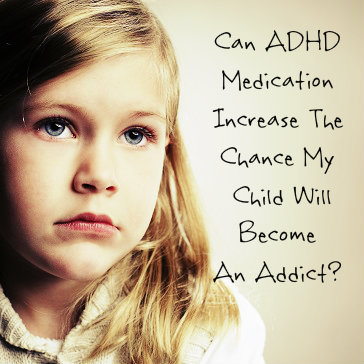 ADHD is a disorder that is characterized by difficulty focusing and paying attention, impulsive and inappropriate behaviors and hyperactivity. These often manifest during school hours making academic success a major challenge for kids with ADHD. Medications used to treat the disorder are stimulants. This may seem counterintuitive, but they dramatically reduce hyperactive impulses, and allow children to focus and pay attention. For the best results, a combination of medication and behavioral therapy is often recommended by experts.
ADHD is a disorder that is characterized by difficulty focusing and paying attention, impulsive and inappropriate behaviors and hyperactivity. These often manifest during school hours making academic success a major challenge for kids with ADHD. Medications used to treat the disorder are stimulants. This may seem counterintuitive, but they dramatically reduce hyperactive impulses, and allow children to focus and pay attention. For the best results, a combination of medication and behavioral therapy is often recommended by experts.
Are ADHD Drugs Addictive?
Stimulants used to treat ADHD, including Adderall and Ritalin, are addictive. Like other addictive drugs, they produce a pleasurable sensation related to certain brain chemicals. If these drugs are abused over time, the user can become addicted. When taken as directed, however, the risk of becoming addicted to these drugs is low.
If you monitor your child’s intake of his ADHD medications and follow your doctor’s instructions carefully, there is little chance that he will become addicted. It is natural to be concerned about the possibility. If it makes you more comfortable, keep the medication locked away and give the right dose to your child when he needs it. By controlling the administration, you can be certain he is not taking more than he is supposed to.
Does Use Of ADHD Drugs Lead To Further Drug Abuse?
There has been some debate about whether or not being medicated with stimulants for ADHD puts children at risk for later drug abuse. The best answer so far, thanks to researchers, is no. There seems to be little to no evidence that using ADHD medications as directed will lead to experimentation with other drugs, or addiction.
The greater danger results from the misuse of ADHD medications as a study drug. Teens and young adults, especially those in high school and college, abuse prescription stimulants as an aid to both studying and partying. One major reason for this abuse is that the medications have the effect of helping them stay awake. If a student needs to cram for an exam, she might take Adderall to stay up all night. Some students even take the medications to stay up late for the purpose of partying all night long. Both habits are very risky because they involve using addictive drugs without supervision from a doctor. This behavior can lead to addiction and other health problems.
Making Sure All Of Your Questions Are Answered When It Comes To ADHD Meds
The bottom line is that your child with ADHD could benefit greatly from supervised use of stimulant medications. If your doctor wants your child to try one, make sure all of your questions are answered and your concerns are addressed, but rest assured that using these drugs will not make your child an addict or a future drug abuser. Supervise your child, explain to him the dangers of abusing any kind of drug, and speak to your doctor to make sure that you and your child feel comfortable going forward with treatment.
Learn More About The ADHD And Drug Abuse Connection
23 Jan 2014
What Is Kratom And What Are Its Health Risks?
Kratom is the common name for an herbal drug obtained from a tree species called Mitragnya speciosa. This drug has a history of use in Southeast Asia and current evidence indicates that its use is currently on the rise in the U.S., where consumers can make legal purchases over the Internet. Kratom apparently has the potential to


